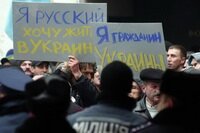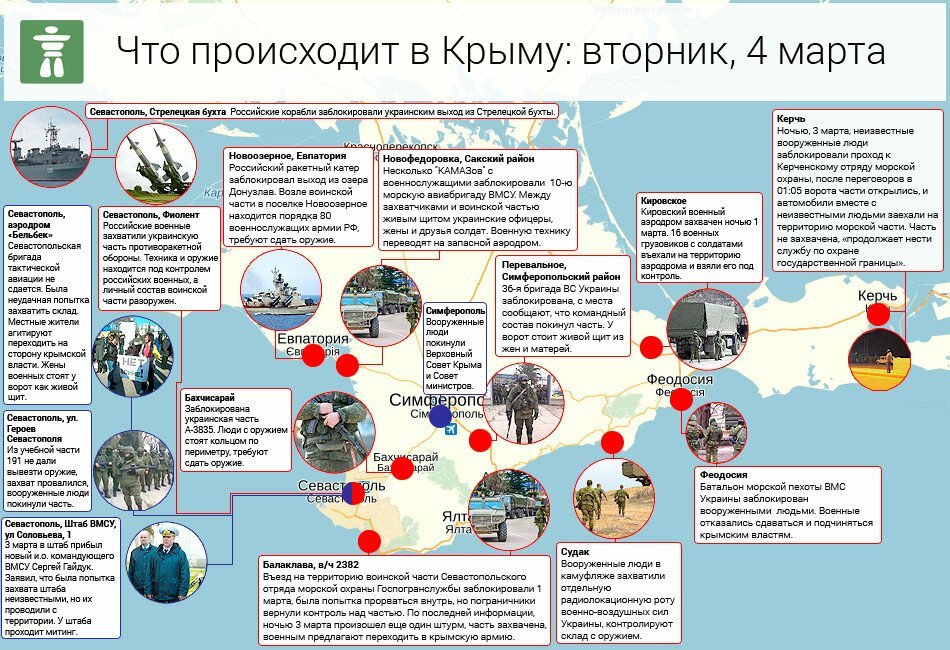
Activation of pro-Russian public and political organizations in Ukraine, as well as bringing of additional Russian troops to the territory of the Crimea, have significantly destabilized the socio- political life of the Russian-speaking population of the Southern and Eastern regions of the Ukrainian state. This population is in favor of expanding the rights and powers of some regions and in some cases it is for separation from the state of Ukraine. Unwinding of these events much reminds of the situation in Abkhazia, South Ossetia, Trans-Dniester and even Nagornyi-Karabakh. But those were classic ethnic conflicts, tied to the old indelible blood of previous wars. In them everybody understood clearly, what exactly was the difference between Ossetians and Georgians, Armenians and Azerbaijanis, as well as what differs them all from Russians. In Ukraine, such approaches are not possible because many residents, for example, of Chernigov and Sevastopol or Luhansk and Kirovograd do not really understand how they differ from each other. But the point is not even that. More important is the answer to the following question: what should these regions expect in the future? History has shown in getting of de facto independence by many post-Soviet territorial units, Russia played a fateful role. Many years have passed since the moment, when the pro-Russian population of the former USSR countries became independent. But except by Russia, the breakaway regions have not been recognized by any of the countries of the European Union, Asia, and even of the former Soviet Union. For example, Russia failed to persuade even its faithful ally — Belarus- to recognize the independence of South Ossetia. President Alexander Lukashenko repeatedly promised to reconsider the issue. However, it is clear that he is not ready to take this step, as fears worsening of the already difficult relations with the West and, in particular, with the European Union. Other states have actually closed all their borders, having stopped the work of their consulates. This led to a complete political and economic isolation of unrecognized states, having automatically reinforced their dependence on Russia.
Analysis of the political and economic aspects demonstrates that the current independence of the breakaway former Soviet countries is illusory, and the possibility of their formation as effective states has no prospects. At the moment they are all satisfied with negligible meager subsidies from the Russian economy, which have not improved the economic situation of any of these so-called state formations. On the contrary, they have now innumerable debts and incredible corruption. By the way, Moscow, having isolated these enclaves from the international community, having reinforced their dependence on Russian politics, for some reason immediately forgets about the “brotherly people” and of its promised financial programs for their populations. Thus, during the Georgian-Ossetian conflict, Russia promised to South Ossetia an investment of 11.5 billion roubles for reconstruction. Soon, this amount dropped to 7-8 billion roubles, of which, according to various estimates, the republic received only 1.5-2 billion rubles. It is also necessary to note that Russia, preventing unwanted for itself steps of self-proclaimed authorities, actively resorts to the practice of suspending financial aid to unrecognized states. Over the past 5 years, Russia has repeatedly suspended provision of so-called technical assistance to Trans-Dniester Moldavian Republic for the development of agriculture, support to small business and financing of social projects. In fact, without this help in Trans-Dniester were frozen scholarships, salaries and pensions. The economic isolation holds back the development of social programs. The average monthly salary in Abkhazia and South Ossetia is equivalent to approximately 130 US dollars, in Trans-Dniester — 290 US dollars, while in Georgia and Moldova — 330-350 US dollars.
Dependence of unrecognized states is not confined to economic aspects. A striking example of Russia's blatant interference into domestic politics of South Ossetia is presidential elections of 2011, when candidate Alla Jioeva, who received most of votes but did not suit the Kremlin, was unceremoniously removed from the domestic political field of South Ossetia. Besides, in Abkhazia and South Ossetia to various public positions are appointed only persons suiting the Kremlin. For example, the former de facto President of South Ossetia Eduard Kokoity, to the post of Minister of Defence appointed Russian military intelligence officer Colonel Yahnovets, who was following all instructions from Moscow.
What lessons from this should learn citizens of Ukraine? In the first place, that the empowerment of the territorial units of the former Soviet republics, with the support of Moscow leads to their full political and economic isolation, greater dependence on the Russian state, and always — to a substantial degradation of socio-economic development of the region.







